一般过去时讲解及练习含复习资料
(完整版)一般过去时讲解及练习
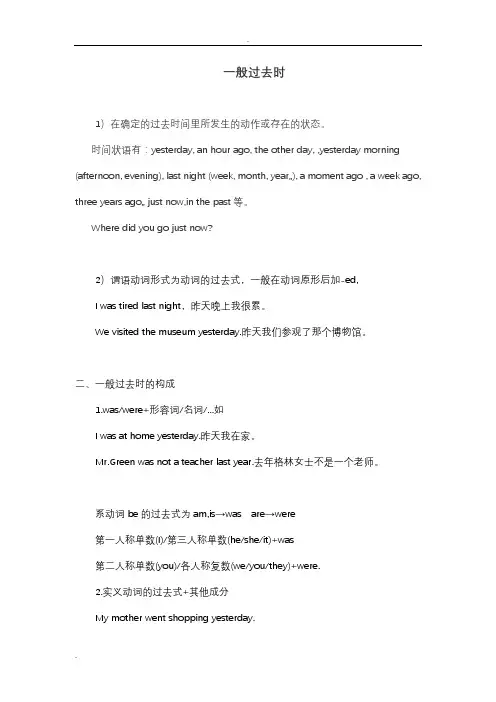
一般过去时1)在确定的过去时间里所发生的动作或存在的状态。
时间状语有:yesterday, an hour ago, the other day, ,yesterday morning (afternoon, evening), last night (week, month, year…), a moment ago , a week ago, three years ago… just now,in the past等。
Where did you go just now?2)谓语动词形式为动词的过去式,一般在动词原形后加-ed,I was tired last night,昨天晚上我很累。
We visited the museum yesterday.昨天我们参观了那个博物馆。
二、一般过去时的构成1.was/were+形容词/名词/...如I was at home yesterday.昨天我在家。
Mr.Green was not a teacher last year.去年格林女士不是一个老师。
系动词be的过去式为am,is→was are→were第一人称单数(I)/第三人称单数(he/she/it)+was第二人称单数(you)/各人称复数(we/you/they)+were.2.实义动词的过去式+其他成分My mother went shopping yesterday.我妈妈昨天去购物了。
His uncle worked in Beijing in 2014.他叔叔2014年在北京工作。
三、一般过去时的句式四、动词过去式的变化规则3 used toused to + do:"过去常常"表示过去习惯性的动作或状态,但如今已不存在。
Mother used to take a walk. (过去常常散步)二、构成及变化1. Be动词在一般过去时中的变化:am 和is在一般过去时中变为was。
(完整版)初中一般过去时详细讲解与练习
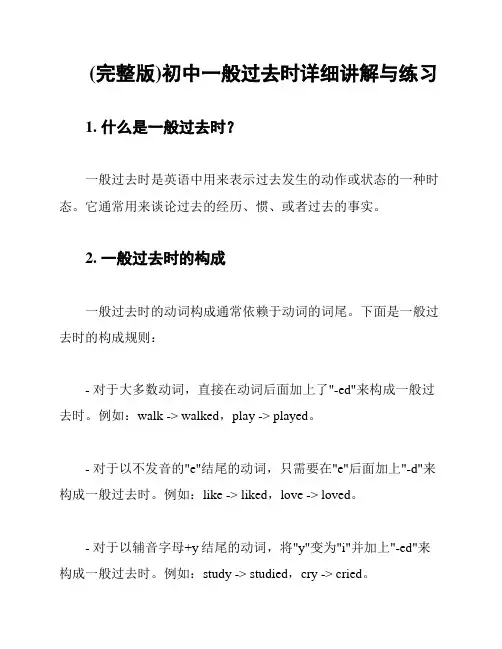
(完整版)初中一般过去时详细讲解与练习1. 什么是一般过去时?一般过去时是英语中用来表示过去发生的动作或状态的一种时态。
它通常用来谈论过去的经历、惯、或者过去的事实。
2. 一般过去时的构成一般过去时的动词构成通常依赖于动词的词尾。
下面是一般过去时的构成规则:- 对于大多数动词,直接在动词后面加上了"-ed"来构成一般过去时。
例如:walk -> walked,play -> played。
- 对于以不发音的"e"结尾的动词,只需要在"e"后面加上"-d"来构成一般过去时。
例如:like -> liked,love -> loved。
- 对于以辅音字母+y结尾的动词,将"y"变为"i"并加上"-ed"来构成一般过去时。
例如:study -> studied,cry -> cried。
- 部分动词的一般过去时需要进行不规则变化。
例如:go -> went,eat -> ate。
3. 一般过去时的用法一般过去时通常用来描述以下情况:- 过去发生的动作:I walked to school yesterday.- 过去的经历:He lived in London for five years.- 过去的事实:She was a teacher in the past.4. 一般过去时的句型练下面是一些练,帮助加深对一般过去时的理解和运用:1. 请用一般过去时填空:Yesterday, I ________ (watch) a movie at home.2. 完成句子:He _____ (visit) his grandparents last summer.3. 改写句子,使用一般过去时:I read a book yesterday. (改为否定句)4. 改写句子,使用一般过去时:They played basketball in the park. (改为疑问句)5. 总结一般过去时是用来表示过去发生的动作或状态的一种时态。
人教版八年级上册一般过去时语法讲解及练习(含答案)
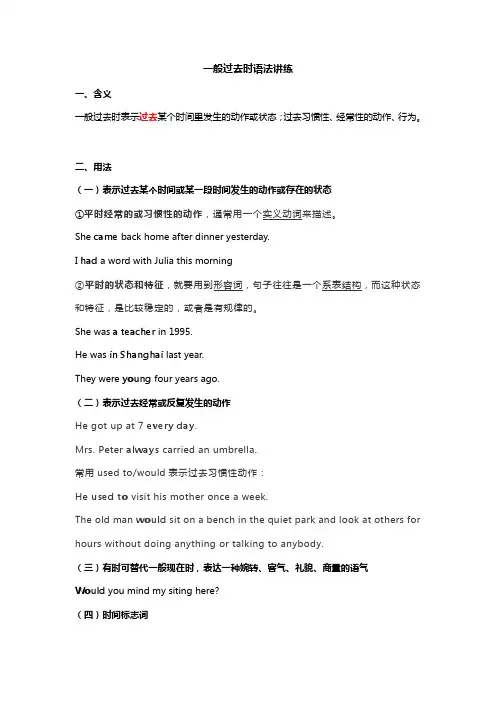
一般过去时语法讲练一、含义一般过去时表示过去某个时间里发生的动作或状态;过去习惯性、经常性的动作、行为。
二、用法(一)表示过去某个时间或某一段时间发生的动作或存在的状态①平时经常的或习惯性的动作,通常用一个实义动词来描述。
She came back home after dinner yesterday.I had a word with Julia this morningHe was in Shanghai last year.They were young four years ago.(二)表示过去经常或反复发生的动作He got up at 7 every day.Mrs. Peter always carried an umbrella.常用used to/would表示过去习惯性动作:He used to visit his mother once a week.The old man would sit on a bench in the quiet park and look at others for hours without doing anything or talking to anybody.(三)有时可替代一般现在时,表达一种婉转、客气、礼貌、商量的语气Would you mind my siting here?(四)时间标志词yesterday, the day before yesterday, last week/year/summer , two/three/days/weeks ago, that morning/winter/day/year, those days/years, at that time/moment, in 1990, just now, in the old days, two hours later, one day, when I was …years old/when I was young…三、句型结构(一)be动词四、动词过去式(过去式)的变化规则(一)直接加edlisten-listened visit-visited walk-walked(二)以e结尾,直接加dlive-lived hope-hoped(三)以辅音字母加y结尾的动词,变y为i加edcarry-carried study-studied(四)以重读闭音节结尾,如末尾只有一个辅音字母,双写辅音字母加edshop-shopped stop-stopped drop-dropped plan-planned fit-fitted prefer-preferredI lived ( live )in Shanghai in 2003.(五)不规则动词过去式的变化需特殊记忆buy-bought go-went read-readI read (read) English yesterday morning.【注意事项】1、一般过去时只说明过去的事情,不强调动作对现在的影响。
超详细一般过去时的全面讲解【附练习与答案】
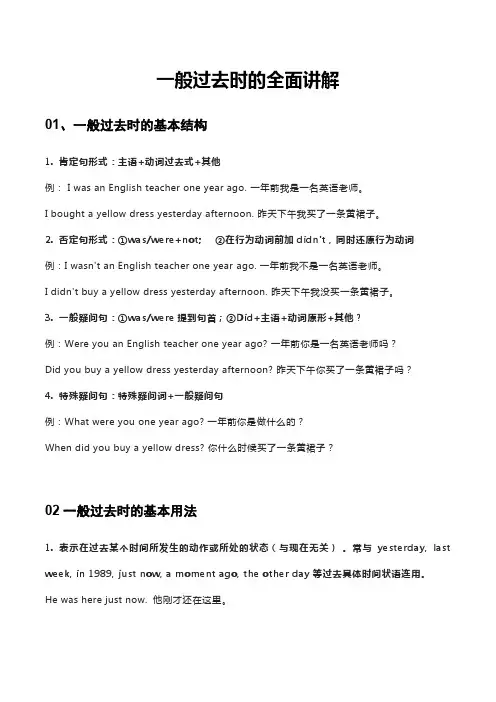
一般过去时的全面讲解01、一般过去时的基本结构1. 肯定句形式:主语+动词过去式+其他例: I was an English teacher one year ago. 一年前我是一名英语老师。
I bought a yellow dress yesterday afternoon. 昨天下午我买了一条黄裙子。
2. 否定句形式:①was/were+not; ②在行为动词前加didn't,同时还原行为动词例:I wasn't an English teacher one year ago. 一年前我不是一名英语老师。
I didn't buy a yellow dress yesterday afternoon. 昨天下午我没买一条黄裙子。
3. 一般疑问句:①was/were提到句首;②Did+主语+动词原形+其他?例:Were you an English teacher one year ago? 一年前你是一名英语老师吗?Did you buy a yellow dress yesterday afternoon? 昨天下午你买了一条黄裙子吗?4. 特殊疑问句:特殊疑问词+一般疑问句例:What were you one year ago? 一年前你是做什么的?When did you buy a yellow dress? 你什么时候买了一条黄裙子?02一般过去时的基本用法1. 表示在过去某个时间所发生的动作或所处的状态(与现在无关)。
常与yesterday, last week, in 1989, just now, a moment ago, the other day等过去具体时间状语连用。
He was here just now. 他刚才还在这里。
What did you do yesterday? 你昨天做了什么事?2. 在过去一段时间内的经常性或习惯性动作。
(完整版)一般过去时讲解及习题
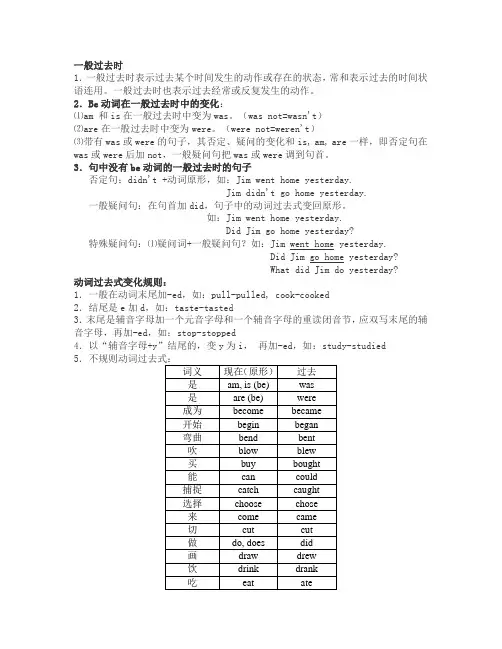
一般过去时1.一般过去时表示过去某个时间发生的动作或存在的状态,常和表示过去的时间状语连用。
一般过去时也表示过去经常或反复发生的动作。
2.Be动词在一般过去时中的变化:⑴am 和is在一般过去时中变为was。
(was not=wasn't)⑵are在一般过去时中变为were。
(were not=weren't)⑶带有was或were的句子,其否定、疑问的变化和is, am, are一样,即否定句在was或were后加not,一般疑问句把was或were调到句首。
3.句中没有be动词的一般过去时的句子否定句:didn't +动词原形,如:Jim went home yesterday.Jim didn't go home yesterday.一般疑问句:在句首加did,句子中的动词过去式变回原形。
如:Jim went home yesterday.Did Jim go home yesterday?特殊疑问句:⑴疑问词+一般疑问句?如:Jim went home yesterday.Did Jim go home yesterday?What did Jim do yesterday?动词过去式变化规则:1.一般在动词末尾加-ed,如:pull-pulled, cook-cooked2.结尾是e加d,如:taste-tasted3.末尾是辅音字母加一个元音字母和一个辅音字母的重读闭音节,应双写末尾的辅音字母,再加-ed,如:stop-stopped4.以“辅音字母+y”结尾的,变y为i,再加-ed,如:study-studied5过去时练习写出下列动词的过去式is\am_____________ fly____________ plant____________ are ____________ drink_____________ play___________ go______________ make ________ does_____________ dance__________ worry___________ ask ___________ taste_____________ eat____________ draw____________ put ____________ throw____________ kick___________ pass____________ do __________Be动词的过去时练习(1)一、用be动词的适当形式填空1.I _______ at school just now.2.He ________ at the camp last week.3.We ________ students two years ago.4.They ________ on the farm a moment ago.5.Yang Ling ________ eleven years old last year.6.There ________ an apple on the plate yesterday.7.There ________ some milk in the fridge on Sunday.8.The mobile phone _______ on the sofa yesterday evening.二、句型转换1. It was exciting.否定句:________________________________________________一般疑问句:____________________________________________肯、否定回答:__________________________________________2. All the students were very excited.否定句:________________________________________________一般疑问句:____________________________________________肯、否定回答:__________________________________________3. They were in his pocket.否定句:________________________________________________一般疑问句:____________________________________________肯、否定回答:__________________________________________Be动词的过去时练习(2)一、用be动词的适当形式填空1.I ______ an English teacher now.2.She _______ happy yesterday.3.They _______ glad to see each other last month.4.Helen and Nancy ________ good friends.5.The little dog _______ two years old this year.6.Look, there ________ lots of grapes here.7.There ________ a sign on the chair on Monday..8.Today _______ the second of June. Yesterday ______ the first of June. It _____ Children's Day. All the students ______ very excited.二、句型转换1. There was a car in front of the house just now.否定句:________________________________________________一般疑问句:____________________________________________肯、否定回答:__________________________________________肯、否定回答:__________________________________________三、中译英1. 我的故事书刚才还在手表旁边。
(完整版)中学一般过去时详细讲解与练习
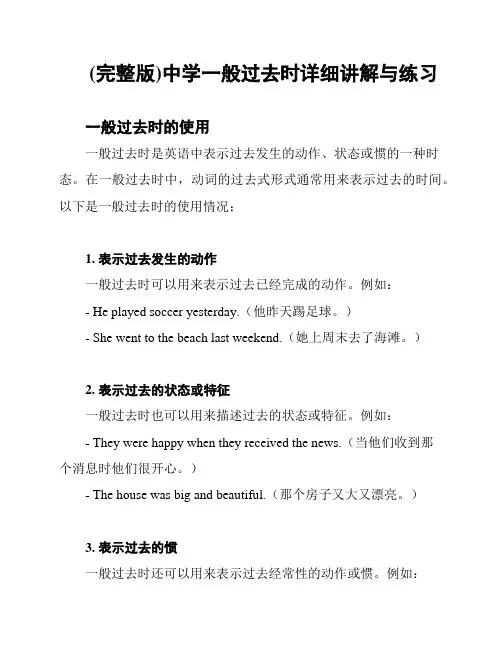
(完整版)中学一般过去时详细讲解与练习一般过去时的使用一般过去时是英语中表示过去发生的动作、状态或惯的一种时态。
在一般过去时中,动词的过去式形式通常用来表示过去的时间。
以下是一般过去时的使用情况:1. 表示过去发生的动作一般过去时可以用来表示过去已经完成的动作。
例如:- He played soccer yesterday.(他昨天踢足球。
)- She went to the beach last weekend.(她上周末去了海滩。
)2. 表示过去的状态或特征一般过去时也可以用来描述过去的状态或特征。
例如:- They were happy when they received the news.(当他们收到那个消息时他们很开心。
)- The house was big and beautiful.(那个房子又大又漂亮。
)3. 表示过去的惯一般过去时还可以用来表示过去经常性的动作或惯。
例如:- I always ate breakfast before going to school.(我过去上学前总是吃早餐。
)- She often went for a run in the evening.(她过去经常在晚上去跑步。
)一般过去时的构成与规则动词变化- 对于大多数动词,一般过去时的构成是在动词原形后面加上-ed。
例如:play → played, work → worked。
- 对于以e结尾的动词,只需要加-d。
例如:live → lived。
- 对于以辅音字母+y结尾的动词,将y变为i然后加-ed。
例如:study → studied。
- 对于以辅音字母结尾的重读闭音节动词,重读闭音节的辅音字母要双写,再加-ed。
例如:stop → stopped。
- 一些动词的过去式形式是不规则的,需要特殊记忆。
例如:go → went, eat → ate。
一般过去时的练以下是一些练,帮助你巩固一般过去时的使用和动词形式变化:1. Fill in the blanks with the correct past tense form of the verbs:- She __________ (watch) a movie last night.- They __________ (visit) their grandparents on the weekend.- He __________ (study) math for two hours yesterday.2. Rewrite the sentences in the past tense:- I go to school every day. (改为过去时)- Jane plays tennis on Saturdays. (改为过去时)- We eat pizza for lunch. (改为过去时)- She __________ (go/went) to the party last night.- We __________ (see/saw) a movie at the cinema.- He __________ (run/ran) in the race and won.请根据上述讲解和练习进行学习和练习,巩固中学一般过去时的用法和动词形式变化。
一般过去时讲解及练习含答案
一般过去时一、一般过去时的定义一般过去时表示过去某一时候或某一段时间所发生了的事情或存在的状态。
常与过去时间yesterday, this morning, just now, a moment ago, in May, last night / year / week, once upon a time, the other day, before …, when – clause, in the past连用。
如:What did you do yesterday 昨天你干了什么?I met Lin Tao this morning. 今天上午我会到了林涛。
I was there a moment ago. 刚才我在那儿二、用法说明1表示在过去某个时间所发生的动作或所处的状态。
常与yesterday, last week, in 1989, just now, a moment ago, the other day等连用。
如:He was here just now. 他刚才还在这里。
What did you do yesterday 你昨天做了什么事?2在过去一段时间内的经常性或习惯性动作。
如:We often played together when we were children. 我们小时候常在一起玩。
注:表示过去经常发生的动作还可用used to 和would。
如:He used to smoke a lot, but he doesn’t now. 他过去经常抽烟,但现在不抽了。
Whenever we were in trouble, he would help us. 每当我们遇到困难,他都会帮助我们。
3表示主语过去的特征或性格。
如:At that time she was very good at English. 那时她英语学得很好。
4用在状语从句中表示过去将来。
如:He said he would wait until they came back.5一般过去时有时可以表示现在,多与want, hope, wonder, think, intend 等动词连用,使语气更委婉。
(完整版)高中一般过去时详细讲解与练习
(完整版)高中一般过去时详细讲解与练习一般过去时的用法一般过去时用来描述过去发生的动作或状态,表示在过去某个时间点或一段时间内发生的事件。
在英语中,一般过去时通常由动词的过去式来表示。
一般过去时的用法如下:1. 表示过去某个时间点的动作或状态:- I went to the park yesterday. (我昨天去了公园。
)- She lived in London in 2010. (她在2010年住在伦敦。
)2. 表示过去一段时间内的动作或状态:- They studied English for three hours. (他们研究英语三个小时。
) - We played soccer every weekend. (我们每个周末都踢足球。
)一般过去时的构成一般过去时通常由动词的过去式构成。
对于大多数动词,过去式是在动词原形后加上"-ed"形成的。
但是也有一些不规则动词的过去式需要单独记忆。
一般过去时的构成如下:- 对于一般动词:动词原形 + "-ed"- 对于以不发音的"e"结尾的动词:动词原形 + "d"- 对于以辅音字母加"y"结尾的动词:去掉"y",加上"ied"- 对于不规则动词:需要单独记忆,没有统一的规则一般过去时的练以下是一些练,帮助你巩固一般过去时的用法和构成:1. 用适当的动词的过去式填空:- She __________ (buy) a new car last week.- We ___________ (visit) our grandparents yesterday.- They ___________ (play) tennis in the evening.2. 改写下列句子,使用一般过去时表达相同的意思:- I am busy now. -> I ________ busy yesterday.- They live in New York. -> They ________ in New York last year.3. 根据给定的情景填写适当的动词的过去式:- Yesterday, John ___________ (watch) a movie at home.- Last summer, we ___________ (go) to the beach for vacation.。
一般过去时详细讲解与练习
一般过去时讲解与练习一、概念:表示过去时间里发生的动作或存在的状态,或者过去习惯性、经常性的动作。
*句中一般有以下时间状语:1.时间+ago:a moment ago片刻之前;two minutes ago两分钟前;three hours ago三个小时前;fivedays ago五天前;one week ago一周前;six months ago六个月前,four years ago四年前st+时间last time上一次last night昨天晚上last week上个星期last month上个月last term 上个学期last Monday上周一last year去年3. yesterday+时间yesterday morning 昨天早上yesterday afternoon 昨天下午yesterday evening昨天晚上the day before yesterday前天the day before yesterday in the morning前天早上4. one +时间one day有一天one morning一天早上one evening一天晚上one Monday afternoon 一个星期一的下午5.其他时间状语just now刚才once upon a time很久以前in 1980在1980年时the other day 几天前at that time在那时二、基本结构:①主语+谓语(动词过去时)+句子其他成分②主语+was/were+形容词/名词/介词短语+过去时间。
三、主语+谓语(动词过去时)+句子其他成分的句型变化:1.肯定句: I worked in that hospital last year. 我去年在那家医院上班。
2.否定句: I didn’t work in that hospital last year.3.一般疑问句:Did you work in that hospital last year?4.肯定和否定回答: Yes, I did. No, I didn’t.四、主语+was/were+形容词/名词/介词短语+过去时间的句型变化1.肯定句: I was fat three years ago. 我三年前很胖。
(完整版word)英语一般过去时复习及解析
(完整版word)英语一般过去时复习及解析一、初中英语一般过去时1.—Have you ever climbed Mount Tai, Carol?—Yes. I ______ in Taian for a week last year and reached the top of it twice.A. had stayedB. stayC. stayedD. have stayed【答案】C【解析】【分析】句意:--卡罗,你曾经爬过泰山吗?--是的,我去年在泰安呆了一周,并且两次到达山顶。
last year,去年,过去的时间,又and连接的是两个并列的动作,所以应该用一般过去时态的。
had stayed,过去完成时态;stay,一般现在时;stayed一般过去时;have stayed,现在完成时,结合句意,故选C。
【点评】考查时态辨析,last+时间是一般过去时的标志词之一。
2.Bella, a young singer, ______ on January, 2015 because of cancer. Her death made us very sad.A. has been deadB. has diedC. was deadD. died【答案】 D【解析】【分析】句意:贝拉,一位年轻的歌手在2015年的1月因为癌症去世了。
她的死叫我们很难过。
根据时间on January, 2015可知用过去式,结合句意和语境应选D。
3.-Have you finished your homework?-Yes, I have. I it this morning.A. finishB. finishesC. finishedD. have finished【答案】C【解析】【分析】句意:你完成你的作业了吗?——是的,我完成了。
我今天早晨完成的。
结合语境可知下文描述的是过去某时发生的动作,故用一般过去时态。
- 1、下载文档前请自行甄别文档内容的完整性,平台不提供额外的编辑、内容补充、找答案等附加服务。
- 2、"仅部分预览"的文档,不可在线预览部分如存在完整性等问题,可反馈申请退款(可完整预览的文档不适用该条件!)。
- 3、如文档侵犯您的权益,请联系客服反馈,我们会尽快为您处理(人工客服工作时间:9:00-18:30)。
一般过去时一、一般过去时的定义一般过去时表示过去某一时候或某一段时间所发生了的事情或存在的状态。
常与过去时间yesterday, this morning, just now, a moment ago, in May, last night / year / week, once upon a time, the other day, before …, when – clause, in the past连用。
如:What did you do yesterday? 昨天你干了什么?I met Lin Tao this morning. 今天上午我会到了林涛。
I was there a moment ago. 刚才我在那儿二、用法说明1表示在过去某个时间所发生的动作或所处的状态。
常与yesterday, last week, in 1989, just now, a moment ago, the other day等连用。
如:He was here just now. 他刚才还在这里。
What did you do yesterday? 你昨天做了什么事?2在过去一段时间内的经常性或习惯性动作。
如:We often played together when we were children. 我们小时候常在一起玩。
注:表示过去经常发生的动作还可用used to 和would。
如:He used to smoke a lot, but he doesn’t now. 他过去经常抽烟,但现在不抽了。
Whenever we were in trouble, he would help us. 每当我们遇到困难,他都会帮助我们。
3表示主语过去的特征或性格。
如:At that time she was very good at English. 那时她英语学得很好。
4用在状语从句中表示过去将来。
如:He said he would wait until they came back.5一般过去时有时可以表示现在,多与want, hope, wonder, think, intend 等动词连用,使语气更委婉。
如:I wondered if you could help me. 不知你能不能帮我一下。
有时用一般过去时也是时态一致的需要。
如:I didn’t know you were here. 没想到你在这里。
注意:1. 表示一系列的动作,尽管有先后,都用一般过去时,最后两个动词之间用and 连结。
如:He opened the door, rushed out and then disappeared. 他打开门,冲了出去,然后就消失了。
2. 注意在语境中理解“我刚才/原来还不……”。
如:—Your ph one number again? I didn’t quite catch it. —It’s 2566666. 请再说一次你的电话号码,好吗?我刚才没听清楚。
是。
三、一般过去时对谓语动词的要求1.动词过去式的构成规则(1) 一般在动词后加-ed。
如:play—played, offer—offered, weigh—weighed, destroy— destroyed, sign—signed.(2) 在以字母e结尾的动词后,只加-d。
如:like—liked, provide—provided, hate — hated, date—dated。
(3) 在以“辅音字母+y”结尾的动词后,则改y为i,再加—ed。
如:supply—supplied, fly—flied, study— studied. (from )(4) 在以单短元音的重读闭音节结尾且,末尾只有一个辅音字母的动词后,双写最后一个辅音字母,再加-ed。
如:plan—planned, refer—referred, regret—regretted, ban—banned.(5)Be动词在一般过去时中的变化:a. am 和is在一般过去时中变为was。
b. are在一般过去时中变为were。
2.不规则动词过去式:见课本四否定句1 带有was或were的句子,即否定句在was或were后加not,(was not=wasn’t)(were not=weren’t)Eg. She was not (wasn’t) tired. They were not (weren’t) interesting.2.句中没有be动词的一般过去时的句子(didn’t代替一般现在时中doesn’t /don’t)否定句:didn’t +动词原形,如:Jim didn’t go home yesterday.五一般疑问句a.一般疑问句:在句首加did,句子中的动词过去式变回原形。
如:Did Jim go home yesterday?b.一般疑问句把was或were放到句首。
Eg Were they delicious? Was she hungry?六特殊疑问句:⑴疑问词+did+主语+动词原形?如:What did Jim do yesterday?⑵疑问词当主语时:疑问词+动词过去式?如:Who went to home yesterday?第二部分:练习一写出下列动词的过去式is\am_________ fly_______ plant________ are ________ drink_________play_______ go________ make ________ does_________ dance________ worry________ ask _____ taste_________ eat__________ draw________put ______ throw________ kick_________ pass_______ do ________二、用be动词的适当形式填空。
1. I ______ an English teacher now.2. She _______ happy yesterday.3. They _______ glad to see each other last month.4. Helen and Nancy ________ good friends.5. The little dog _____ two years old this year.6. Look, there ________ lots of grapes here.7. There ________ a sign on the chair on Monday.8. Today _____ the second of June. Yesterday ______ the first of June. It _____ Children’s Day.All the students ______ very excited.二、句型变换。
There was a car in front of the house just now.否定句:______________________________________________一般疑问句:___________ 肯定回答:___________否定回答:__________2 They played football in the playground.否定句:________________________________________________一般疑问句:___________ 肯定回答:___________否定回答:__________三、用所给动词的适当形式填满空白。
1. I ______ (watch) a cartoon on Saturday.2. Her father _______ (read) a newspaper last night.3. We _________ to zoo yesterday, we _____ to the park. (go)4. ______ you _______ (visit) your relatives last Spring Festival?5. ______ he _______ (fly) a kite on Sunday? Yes, he ______.6. Gao Shan _______ (pull) up carrots last National Day holiday.7. I ____________ (sweep) the floor yesterday, but my mother ______.8. What _____ she _____ (find) in the garden last morning?She ____ (find) a beautiful butterfly.9. It ____ (be) Ben’s birthday last Friday10. We all ___ (have) a good time last night.11. He _____ (jump) high on last Sports Day.12. Helen ____ (milk) a cow on Friday.13. She likes ______ newspapers, but she ______ a book yesterday. (read)14. He _______ football now, but they _______ basketball just now. (play)15. Jim’s mother _________ (plant) trees just now.16. _______ they ________ (sweep) the floor on Sunday? No, they _____.17. I _______ (watch) a cartoon on Monday.18 We ____ (go) to school on Sunday.19. It ____ (be) the 2nd of November yesterday.Mr White ___ (go) to his office by car.20. Gao Shan ________ (put) the book on his head a moment ago.21. Don’t ______ the house. Mum _______ it yesterday. (clean)22. What ____ you ______ just now? I _______ some housework. (do)23. They _________ (make) a kite a week ago.24. I want to ______ apples.But my dad _______ all of them last month. (pick)25. _______ he ______ the flowers this morning? Yes, he _____. (water)26. She ____ (be) a pretty girl. Look, she _____ (do) Chinese dances.27. The students often _________ (draw) some pictures in the art room.28.What ______ Mike do on the farm? He ________ cows. (milk)一般过去时练习题一、单项选择:从下列各题后所给的四个选项中选择最佳答案填空。
